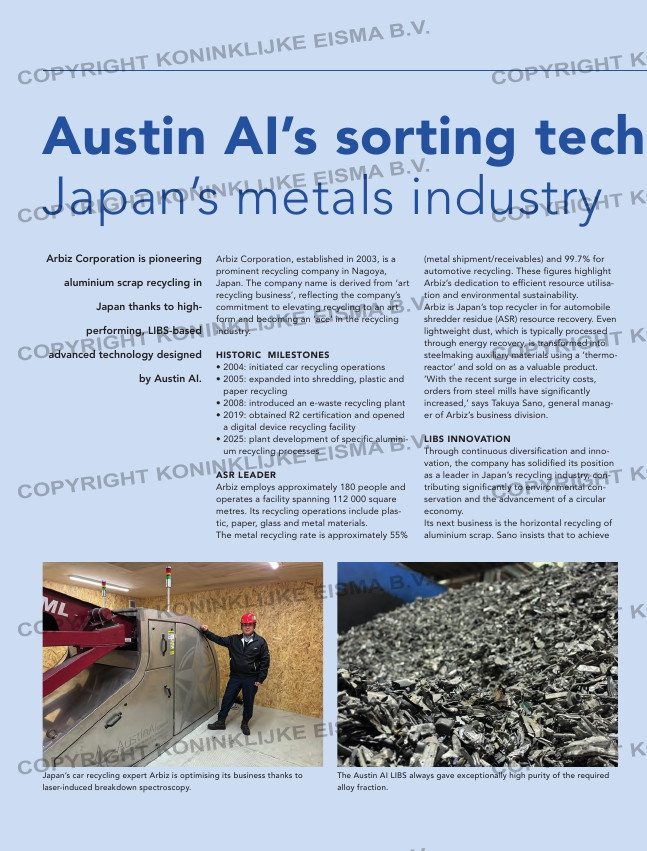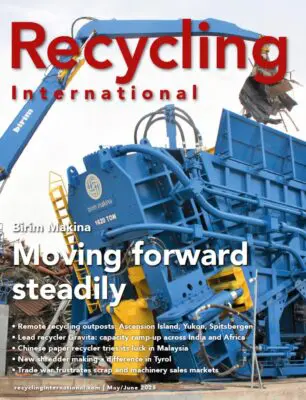Page 56 from: Recycling International May/June issue

Austin AI’s sorting technology transforms
Japan’s metals industry
Arbiz Corporation is pioneering
aluminium scrap recycling in
Japan thanks to high-
performing, LIBS-based
advanced technology designed
by Austin AI.
Arbiz Corporation, established in 2003, is a
prominent recycling company in Nagoya,
Japan. The company name is derived from ‘art
recycling business’, reflecting the company’s
commitment to elevating recycling to an art
form and becoming an ‘ace’ in the recycling
industry.
HISTORIC MILESTONES
• 2004: initiated car recycling operations
• 2005: expanded into shredding, plastic and
paper recycling
• 2008: introduced an e-waste recycling plant
• 2019: obtained R2 certification and opened
a digital device recycling facility
• 2025: plant development of specific alumini-
um recycling processes
ASR LEADER
Arbiz employs approximately 180 people and
operates a facility spanning 112 000 square
metres. Its recycling operations include plas-
tic, paper, glass and metal materials.
The metal recycling rate is approximately 55%
(metal shipment/receivables) and 99.7% for
automotive recycling. These figures highlight
Arbiz’s dedication to efficient resource utilisa-
tion and environmental sustainability.
Arbiz is Japan’s top recycler in for automobile
shredder residue (ASR) resource recovery. Even
lightweight dust, which is typically processed
through energy recovery, is transformed into
steelmaking auxiliary materials using a ‘thermo-
reactor’ and sold on as a valuable product.
‘With the recent surge in electricity costs,
orders from steel mills have significantly
increased,’ says Takuya Sano, general manag-
er of Arbiz’s business division.
LIBS INNOVATION
Through continuous diversification and inno-
vation, the company has solidified its position
as a leader in Japan’s recycling industry, con-
tributing significantly to environmental con-
servation and the advancement of a circular
economy.
Its next business is the horizontal recycling of
aluminium scrap. Sano insists that to achieve
the high-quality recycling that Arbiz values, a
laser-induced breakdown spectroscopy (LIBS)
sorter was the ‘essential solution’.
‘LIBS is an optical emission spectroscopy used
to measure elemental concentrations in differ-
ent materials,’ he explains. ‘LIBS machines are
more and more widely used in industries for
the analysis of metals and alloys, being able to
identify a wide range of elements, with high
precision.
‘Because of this, LIBS-based sensor sorters are
recognised as the key step in the metals scrap
sorting process line when mixed aluminium
scrap needs to be specifically sorted by alloy
types.’
When Arbiz’s managers decided to implement
a LIBS sensor sorter system at its Nagoya
plant, they searched for possible suppliers and
visited most of them.
‘We were glad to meet the Austin AI Europe
team in Budapest and have a chance to run
our materials through the unique Austin AI
LIBS system, testing different sorting pro-
grammes,’ Sano adds.
100% PURITY
‘At first, based on precisely set Si%, we were
able to separate wrought and cast aluminium
fractions with 100% purity and very high extrac-
tion efficiency. Further on, we sorted not only
6063 but 5052, 3005, ADC12 and other specific
alloys by given elemental compositions.’
The Austin AI LIBS always gave exceptionally
high purity of the required alloy fraction at
reasonably high throughput and reliably per-
formed as low as at <0.1% elemental concen-
tration levels. It provides high flexibility, and it
is easy to change from one sorting pro-
gramme to another.
‘The Austin AI mechanical design is far differ-
ent from all others with the belt-type feeding,’
Sano says. The system uses a two-step vibra-
tory feeder to distribute the material across
the width of the feeder plates, providing a sin-
gular distribution of the pieces and thus ana-
Japan’s car recycling expert Arbiz is optimising its business thanks to
laser-induced breakdown spectroscopy.
The Austin AI LIBS always gave exceptionally high purity of the required
alloy fraction.
56-57_austinai.indd 54 10-04-2025 14:09



